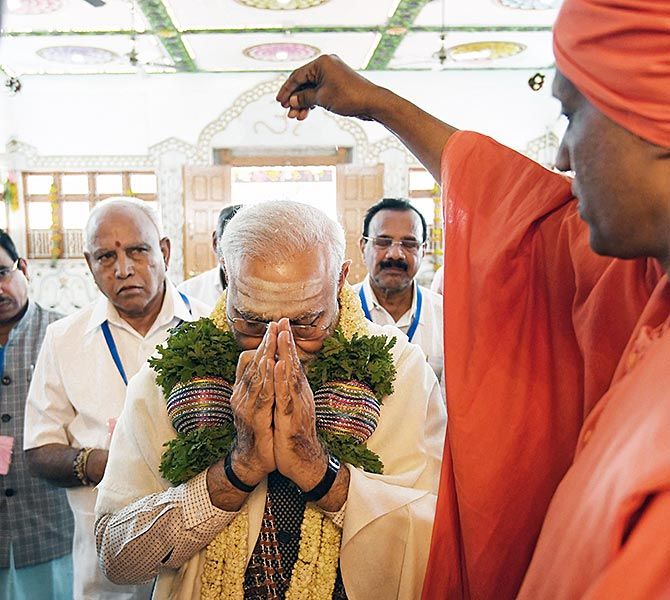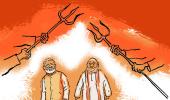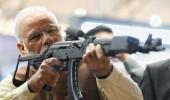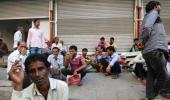'Potent nationalism doesn't just distract from the economic task at hand; it actively undermines it.'

"The BJP has long promoted two core ambitions: Building a culturally Hindu-centric nation and aggressively advancing India's economic development. But, in the midst of a sustained slowdown and given the political dynamics at play, it has decided to subsume the latter to the former," Milan Vaishnav, senior fellow and director of the South Asia Programme at the Carnegie Institute of International Peace, Washington, DC, tells Rediff.com's Archana Masih in the concluding segment of a two-part interview.
- Part 1 of the interview: 'Modi has no clear roadmap for $5 trillion economy'
The CAA-NRC protests have become a polarising issue in the Delhi election and in the country. It resulted in a shooter firing at a peaceful protest with the police as onlookers. How will the CAA-NRC and the politics/divisions arising out of it impact the country and its people?
There's a good news, bad news story here.
On the positive front, it is encouraging to see signs of life in the country's civil society. Agree or disagree with the anti-CAA/NRC protestors, dissent and debate have long been part of the social and democratic fabric of the country.
On the negative front, the protests have also fuelled a counter-polarisation that could spiral out of control.
In fact, it is remarkable how little violence there has been given the ratcheting up of tensions. The fact that the gunman who fired on protestors injured only one protestor's hand is no small matter.
This to me speaks to a larger puzzle in Indian politics. Given the infirmities of the police, the ease with which street power can be mobilised, and the impunity before the courts -- it is a wonder that we don't see more violent outbursts.
Will majoritarianism tear apart the fabric of Indian society?
I've just finished reading Madhav Khosla's new book on the Constitution, India's Founding Moment. The book reminds you how farsighted India's Constitutional framers were, especially given the constraints they were operating under a poor, fractured, unequal society ravaged by colonialism not to mention Partition.
India's secular, democratic framework -- while imperfect -- was the envy of much of the democratic world.
The majoritarian project does away with this and instead fulfills the entire idea of the 'two nation theory' that was widely discredited in India at the time of Partition.
Creating a Hindu-centric polity may appear to provide some benefits in the short run, but these benefits are far outweighed by the costs, in my view.
In its second term, have Prime Minister Modi and Home Minister Shah set India on the course of a Hindu Rashtra against the background of the revocation of Article 370, CAA-NPR-NRC?
What is clear is that, since clinching a historic re-election last May, the ruling party has prioritised Hindu majoritarianism over economic renewal.
The BJP has long promoted two core ambitions: Building a culturally Hindu-centric nation and aggressively advancing India's economic development. But, in the midst of a sustained slowdown and given the political dynamics at play, it has decided to subsume the latter to the former.
I have written elsewhere and believe it to be true that this strain of potent nationalism doesn't just distract from the economic task at hand; it actively undermines it. And, I think we are starting to see some of the costs show up.
What else can be expected from the Modi-Shah combine in their agenda for the country?
The government has gone on record as saying it does not have any plans for an all-India NRC yet -- 'yet' being the operative word.
Someone wrote a column recently saying the objective is not immediately enacting an all-India NRC, but rather keeping the idea of doing so on the front burner.
In that way, it could become the 21st century Ram Mandir in terms of its political symbolism. I think there is something to that.
Obviously, there is talk of ushering in a Uniform Civil Code, which is something that many liberals cheer in principle.
The concern, of course, is that a new civil code will not aspire to a version of neutral universalism, but will instead be deeply coloured by Hindu tenets, thereby eroding the protection of minority rights.
The other issue that is under discussion is bringing forth a national bill that would ban coercive religious conversion -- something several states have already done through legislation.
Although these laws only apply to 'forced' conversions, there are fears that such provisions can be interpreted liberally so as to curtail even voluntary religious conversion.
In the absence of a cohesive and strong opponent, have students become the Modi-Shah combine's strongest opponents?
There is no question that students are at the heart of the biggest pushback that the Modi government has received from civil society since 2014.
I do not think the protests can be reduced to students alone, but they appear to form the backbone for sure.
Will this throw up a new, fresh, leadership? How will this play out and affect the Modi-Shah behemoth?
This is the million-dollar question. I think many observers have been saying for some time that the Opposition must undergo a fundamental political regeneration.
Students could be at the heart of this rebirth. What is clear is that the Congress party is not seeking new leadership; rather, it is doubling down on its old leadership by bringing Rahul Gandhi back as president.
Regional parties are also ossified in terms of their top ranks. So change could come from students but, at this point, it is hard to identify who exactly will lead the charge.
What do you see as India's biggest problem this year?
India faces a very real question about what kind of democratic order it wants to establish to manage the unique diversity it has to contend with.
It can recommit itself to finding inspiration from its 'unity in diversity' or it can instead push ahead with a monolithic, top-down, view of creating a Hindu Rashtra.
The legal and Constitutional architecture governing individual citizenship in India is changing in dramatic ways.
One observes a new, underlying, trend toward viewing citizenship through the lens of religious or communal identities. In my view, this creates more challenges than it resolves.
The BJP has reduced its political foothold in India by nearly 40% compared to last year. Is its grip over India loosening?
Well, the BJP has certainly ceded political space at the state level. One can see that clearly from the declining number of states under its control. But remember, it still has no peer at the national level.
Indeed, state-level losses and national-level dominance are completely consistent with one another (one only must look back at India Gandhi's heyday to recall this).
What do you see as the reasons for its loss in state elections?
The economy plays a big role here. I, for one, believe that the economy does shape voting behaviour at the state level.
My research shows there is some truth to that. Many of the state-level verdicts we are seeing are most easily understood as anti-incumbent decisions. The BJP has the bad fortune of being the incumbent in a great many states.











 © 2025
© 2025